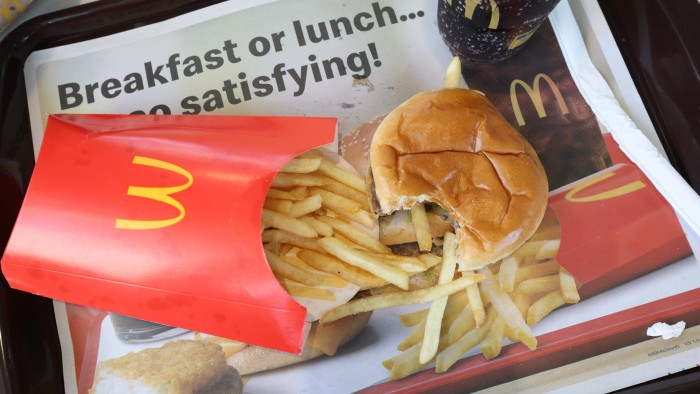Unlock the Editor’s Digest for free
Roula Khalaf, Editor of the FT, selects her favourite stories in this weekly newsletter.
Depending on who you ask, US consumers are either buckling under pressure or doing just fine.
At McDonald’s, even $5 value meals have struggled to tempt customers into the stores. The fast-food giant reported a 3.6 per cent drop in US same-store sales for the quarter that ended in March. That is the biggest year-on-year quarterly fall since Covid. The uncertainty unleashed by President Donald Trump’s tariff wars has not only prompted some companies to shelve their spending plans. American consumers are doing the same.
Historically, fast-food chains tend to do well when times get tough. Diners looking to save a few bucks trade down from full-service restaurants, or fast-casual ones — the industry’s name for outfits that have counter service but are marketed as classier than the average burger joint.
But this defensive trade is not what McDonald’s is seeing. It said the pressures that have been weighing on low-income consumers had started spilling over into middle-income consumers. People are simply not visiting the Golden Arches as often.
It is an industry-wide problem. Chipotle, Domino’s Pizza, Starbucks, Pizza Hut and KFC have all reported a slowdown in their US businesses. Consumer goods companies such as PepsiCo and Procter & Gamble have also pointed to a pressured customer.
Yet not everyone is tightening their belts. Credit card companies including American Express and payment processors such as Visa continue to see robust spending among Americans.
One reason is that they are particularly exposed to the one group that appears to still be eating out and enjoying life: the high earners. Both American Express and JPMorgan, which cater to wealthier users with higher credit scores, reported a 7 per cent increase in US credit card spending during the first quarter. At Visa, spending among the “most affluent” drove 6 per cent growth in US payment volume during the same period.
Some spending has probably simply been brought forward as Americans rush to buy products to get ahead of Trump’s tariffs. That, at least, is one way to read official data that showed personal spending rose 0.7 per cent in March. Credit card spending may also benefit from lower-income users leaning on their cards to pay for purchases.
That a softening economy hits those in different pay brackets differently is clear. But the impact tends to creep up to higher earners over time. Richer consumers may not yet be rethinking their lunch plans, but McDonald’s has given a flavour of what might soon be a much broader problem.
Source link









